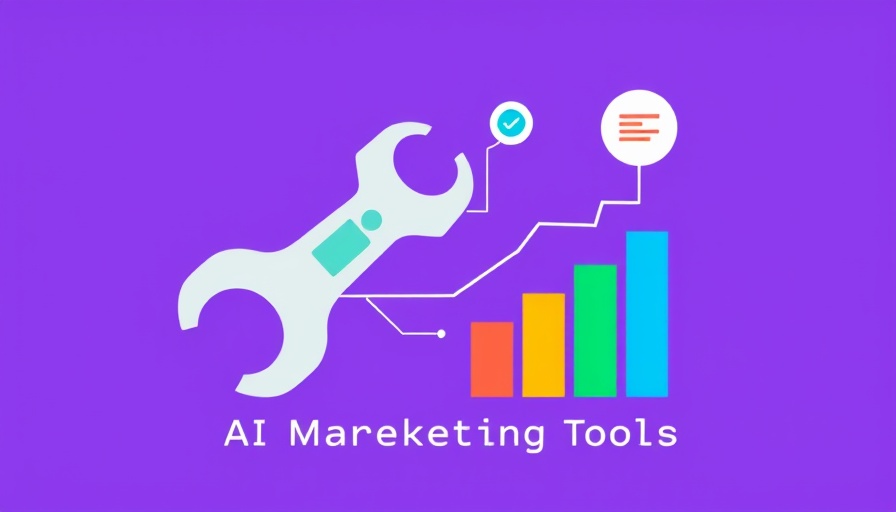
Embracing AI: A Game Changer for Small Businesses
In today's fast-paced digital landscape, small businesses are continually seeking ways to remain competitive and effectively engage with their customers. Artificial Intelligence (AI) has emerged as a vital tool for enhancing marketing strategies, providing innovative solutions that not only save time but also enrich customer experiences. As small business owners grapple with various marketing tasks, the popularity of AI marketing tools is skyrocketing, transforming traditional approaches into data-driven methodologies.
Understanding AI Marketing Tools: What Small Businesses Need to Know
So, what exactly qualifies as an AI marketing tool? At its core, these tools leverage technologies such as machine learning and natural language processing to facilitate marketing tasks that range from data analysis to customer engagement. For small businesses, this means having access to tools that can assist in crafting personalized experiences and streamlining content creation, all while improving overall productivity.
Key Benefits of Implementing AI in Marketing
The integration of AI into marketing strategies can yield significant benefits for small businesses, particularly in the realms of personalization and efficiency. According to recent studies, 97% of marketing leaders assert that AI proficiency is vital for their roles. Here are some of the standout advantages:
- Personalization and Customer Engagement: AI empowers small businesses to tailor marketing efforts, offering personalized experiences without requiring extensive resources. By understanding customer behavior, businesses can send targeted emails, suggest relevant products, and create customized landing pages that resonate with their audience.
- Content Creation at Scale: Small business marketers often wear multiple hats, leading to overwhelmed teams. AI-driven tools can assist with content ideation and repurposing, allowing marketers to maintain a consistent brand voice while significantly reducing mental workload.
- Data-Driven Decision Making: With AI's analytics capabilities, small businesses can derive insights from vast amounts of data quickly. Real-time trend analysis and performance assessment can enhance decision-making processes, keeping marketing strategies agile and responsive.
Future Trends: What Lies Ahead for AI in Marketing?
As we advance towards 2025, the AI marketing landscape is poised for immense growth and sophistication. Small businesses will likely see:
- More Advanced Personalization: The use of AI will elevate personalization further—allowing for hyper-targeting that goes beyond age or gender, delving into behavioral patterns and predictive analysis.
- Greater Automation: Workflows that once required substantial manual intervention will increasingly become automated, freeing teams to focus on strategy and creativity.
- Seamless Integrations: Expect more cohesive integrations among different marketing tools, creating an ecosystem where businesses can share and leverage data across platforms effortlessly.
Getting Started: Essential AI Tools for Your Marketing Arsenal
To make the most of AI in marketing, small businesses can begin with a few standout tools. Some noteworthy tools that are already making waves include:
- Sprout Social: Ideal for social media management, this tool harnesses AI for publishing, listening, and analytics, significantly enhancing a business's outreach.
- HubSpot: This all-in-one marketing platform integrates AI functionalities to streamline tasks like email marketing and customer relationship management.
- Mailchimp: Using machine learning, Mailchimp allows businesses to optimize their email campaigns by automating segmentation and content personalization.
Overcoming Challenges: Navigating the AI Terrain
Despite the benefits, small businesses may face challenges in adopting AI. Common pitfalls include data privacy concerns and the implementation of new technologies. To navigate these issues:
- Invest in training: Ensuring that your team knows how to utilize tools effectively is paramount to maximizing ROI.
- Start small: Begin with a single tool that addresses a specific need, gradually integrating more complex systems as your familiarity grows.
- Seek community support: Engaging with peers or joining professional groups can help in sharing best practices and lessons learned in the implementation process.
Conclusion: The Road Ahead for Small Businesses
The future of marketing is undeniably intertwined with AI technologies. By harnessing these tools, small businesses can enhance their marketing strategies, improving both efficiency and customer experiences. Adopting AI marketing tools isn’t just an option; it's becoming imperative for companies that wish to thrive in the coming years. As you look towards 2025, understanding and leveraging these technologies can position your business for growth and success.
Explore these insights and consider integrating AI marketing tools; the potential rewards are substantial.
 Add Row
Add Row  Add
Add 




Write A Comment